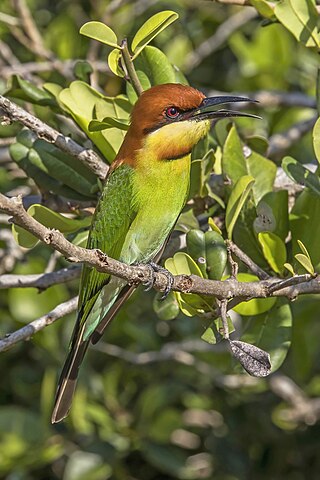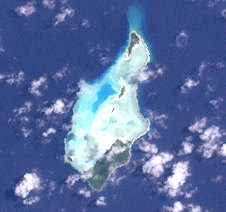
The chestnut-headed bee-eater, or bay-headed bee-eater, is a near passerine bird in the bee-eater family Meropidae. It is a resident breeder in the Indian subcontinent and adjoining regions, ranging from India east to Southeast Asia.

The Committee of Secret Correspondence was a committee formed by the Second Continental Congress and active from 1775 to 1776. The Committee played a large role in attracting French aid and alliance during the American Revolution. In 1777, the Committee of Secret Correspondence was renamed the Committee of Foreign Affairs.

Rousettus is a genus of Old World fruit bats or megabats, referred to as rousette bats. The genus is a member of the family Pteropodidae. The genus consists of seven species that range over most of Africa to southeast Asia, and the islands of the south Pacific. They are among the few megabats capable of echolocation, and the only genus of megabats known to use vocal echolocation.

The white-crowned forktail is a species of forktail in the family Muscicapidae. Scientifically described in 1818, it has five subspecies, each occupying a different geographic range. The largest of the forktails, Enicurus leschenaulti, is between 25 and 28 centimetres long. It has a black throat and breast, black mantle, and largely black wings. The rump and lower back are white, and the bird has a prominent white crown, from which it gets its name. As with other forktails, the tail is long, deeply forked, and banded in black and white. A variety of whistling and clicking calls have been described. Slight morphological differences have been observed between subspecies.
Julien Alexandre Achard de Bonvouloir was a secret French envoy to the American colonies, in 1775.

Émile Bonvouloir was a Canadian provincial politician.
Aphaenops is a genus of beetles in the family Carabidae, containing the following species: All species in the genus are obligate troglobites, and each species is usually endemic to a single cave system; they are unpigmented, and have no functional eyes.
Aphaenops bonneti is a species of beetle in the subfamily Trechinae. It was described by Foures in 1948.
Aphaenops bucephalus is a species of beetle in the subfamily Trechinae. It was described by Dieck in 1869.
Aphaenops coiffaitianus is a species of beetle in the subfamily Trechinae. It was described by A. Gaudin in 1947.
Aphaenops delbreili is a species of beetle in the subfamily Trechinae. It was described by Genest in 1983.
Aphaenops eskualduna is a species of beetle in the subfamily Trechinae. It was described by Coiffait in 1959.
Aphaenops fresnedai is a species of beetle in the subfamily Trechinae. It was described by Faille & Bourdeau in 2011.

The Bonvouloir Islands are a group of uninhabited islands of Papua New Guinea. They are in the Louisiade Archipelago. The islands are located 100 kilometres northwest of Misima and form the northernmost group of the Louisiade Archipelago. The main islands are East Island, Panamole Island and Hastings Island

Hastings Island is one of the Bonvouloir Islands in the Louisiade Archipelago. Administratively, it is located in Milne Bay Province of Papua New Guinea.

The Strathord Islands are an uninhabited island group of five islands in the Louisiade Archipelago of Papua New Guinea. Politically they belong to the province of Milne Bay in the southeastern region of Papua New Guinea.

Trechini is a large tribe of ground beetles in the family Carabidae. There are more than 270 genera and over 2,400 described species in Trechini, found throughout the world.

Trixagus is a genus of small false click beetles in the family Throscidae. There are more than 30 described species in Trixagus.
Balgus is a genus of click beetle. They are one of several genera in the family which contain at least one bioluminescent species. The genus was originally placed in the family Eucnemidae, later transferred to Throscidae, but recent classifications establish them firmly within Elateridae.








